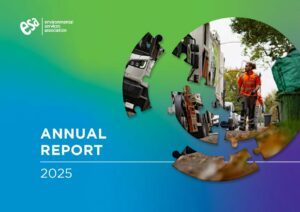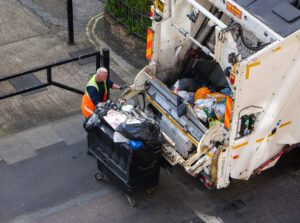The UK has a significant opportunity to contribute towards meeting net zero targets through energy from waste-powered (EfW) heat networks, according to a new report by economics consultancy NERA, commissioned by the Environmental Services Association (ESA) and Resource Recovery UK (RRUK).
The new report, which was published on 25th September and is available here, underscores the potential value of heat networks for decarbonising homes and businesses, supporting the nation’s legally binding climate goals, and lowering household energy bills.
Heat networks currently account for less than 3% of the UK’s heat demand, compared to significantly higher rates in other European countries. The Government has set a goal of expanding this to 20% by 2050, but the report warns that, without swift action, this could be missed and risks the UK falling further behind its international competitors.
The report outlines a clear policy and regulatory opportunity: by harnessing heat produced by EfW facilities, the UK can fuel low-cost and low-carbon heat networks, reducing greenhouse gas emissions and delivering broad economic and social benefits.
Heat networks are currently underutilised in the UK, serving less than 3% of the heat demand. In contrast, countries like Denmark and Sweden have market penetration rates of 64% and 53%, respectively. To reach its 2050 target of 20%, the UK must accelerate its adoption of this vital technology.
The report identifies that EfW-powered heat networks could save households between £4,000 to £22,000 over a 25-year period, compared to traditional heating methods like gas boilers and heat pumps. These networks also offer significant reductions in carbon emissions by minimising the use of gas in homes, which in turn improves air quality. This approach benefits both high-density urban areas and less densely populated regions. Additionally, with the UK being a net gas importer – much of which is used for heating – transitioning to domestic heat sources through EfW networks could help reduce reliance on imported gas.
In its report, NERA calls for swift action from the UK Government and energy regulator Ofgem to implement policies that incentivise investment in heat networks. This includes establishing effective price regulation and introducing mechanisms to ensure a continuous and reliable supply of heat from EfW plants. The report also suggests creating incentive schemes that encourage better coordination among stakeholders involved in the production, distribution, and consumption of EfW heat. By addressing the existing ‘first-mover disadvantage’, these incentives could unlock the full potential of heat networks.
Jacob Hayler, Executive Director of ESA said: “This report underscores the critical role that energy from waste can play in the UK’s decarbonisation efforts, making the most of the heat produced as a by-product and advancing towards a circular economy. EfW-powered heat networks represent a significant opportunity to not only cut carbon emissions but also to drive innovation and efficiency across the sector.”
Owen Michaelson, Chair of RRUK and CEO of Encyclis said: “The findings of this report reveal a significant and largely untapped opportunity for the UK to advance towards its net zero targets, with energy from waste playing a pivotal role in developing scalable heat networks. This approach promises not only to reduce carbon emissions but also to deliver substantial cost savings to households. The potential is immense, and with coordinated effort between policymakers and industry, we can fully realise these benefits.”
Working with partners, ESA and RRUK members are already investing in projects to supply heat to nearby homes and businesses and ensure this valuable by-product is not wasted.
At Runcorn, Viridor’s EfW facility supplied 470 GWh of heat in 2022 and at Trident Park EfW, Viridor is developing heat offtake for a potential 15.75 MW supply to the Cardiff Heat Network. They are also actively developing Carbon Capture and Storage (CCS) at Runcorn, with plans to expand CCS across the fleet.
The Kemsley facility (pictured) operated by enfinium exports heat to a nearby paper mill, and the company is assessing the scalability of heat offtake for local networks. They are also developing CCS projects, including a potential £800 million investment at Ferrybridge, which could capture 1.2 million tonnes of CO2 annually.
Encyclis’s Earls Gate EfW facility, operational since 2024, delivers 33 MW of heat to neighbouring industries. They are expanding district heating capabilities at other sites and have secured government funding for heat networks at Rookery South. Encyclis is also pioneering CCS technology with a lead emitter project within the DESNZ cluster sequencing programme at Protos.
Cory plans to supply heat to 21,000 homes in Bexley and Greenwich from its Riverside 1 and Riverside 2 EfW facilities, which will also incorporate CCS technology. The company is also exploring the use of thermal batteries to transport waste heat via river, including a potential project to supply low carbon heat to 3,000 homes in central London.




